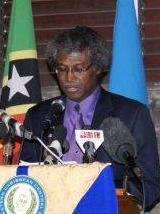BASSETERRE, St Kitts (CUOPM) — Monetary conditions in the Eastern Caribbean Currency Union (ECCU) improved during the year ending March 31, 2014. However, credit conditions tightened further as was evidenced by the widening of the interest rate spread during the same period.

Governor of the Eastern Caribbean Central Bank (ECCB), Sir K. Dwight Venner, informed the 79th meeting of the Council that liquidity in the commercial banking sector remained buoyant as total deposits were estimated to have increased by 5.2 percent compared with 4.2 percent in the corresponding period of 2013.
Venner also reported that economic activity in the tourism sector was estimated to have improved, with an estimated increase in tourism receipts of 2.3 percent.
“Total stay-over visitor arrivals to the ECCU were provisionally estimated to have increased by 1.0 percent from the level recorded in the same period of 2013. The estimates of stay-over visitor arrivals by country of origin indicated an increase of 3.9 percent in the arrivals from the United States.
“However, there was a contraction in the arrivals from the United Kingdom and the Caribbean of 3.1 percent and 2.4 percent respectively, primarily due to the subdued pace of economic activity in those markets,” an ECCB statement said.
The council also noted and welcomed the fiscal improvement across the ECCU.
“The near term outlook and prospects revealed that a strengthening of the economic recovery in the major trading partners of the ECCU was expected to lead to an improvement in foreign exchange inflows thus resulting in an easing in monetary and credit conditions in the short term.
“Council reiterated its commitment to mobilise resources to support the priority areas of fiscal and debt, growth and competitiveness, and financial sector stability,” the statement added.
The Monetary Council agreed to maintain the minimum savings deposit rate at 3.0 percent; and the Central Bank’s discount rate at 6.5 percent.
The Monetary Council noted that as at 31st March 2014, the ECCU financial system continued to exhibit symptoms of stress from the effects of the global economic and financial crisis. However, the system was stable as evidenced by the strength of the EC dollar, the efficiency of the payments and settlements system, increasing deposits, improvement in liquidity and a relatively high level of public confidence elements of stability.
Real gross domestic product (GDP) in the ECCU is expected to increase from 1.1 percent in 2013 to 1.7 percent in 2014 and 2.1 percent in 2015.
It said increasing GDP growth rates is a policy priority for the ECCU member governments as increased growth is likely to strengthen the financial sector and improve fiscal and debt sustainability.
Council reiterated their continued commitment to efforts of fiscal adjustment, coordination and consolidation.
On the BAICO/CLICO issue, the Monetary Council noted that phase three of the ECCU policyholders relief programme will be continued as soon as the next disbursement from Trinidad and Tobago is received.
It noted the current status of CIL, including the approval of the Barbados Cabinet, to implementation of the CIL resolution plan for Barbados policyholders and approved in principle a counterproposal that includes ECCU policyholders.
